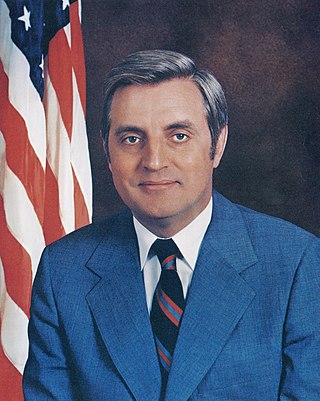Related Research Articles

Walter Frederick "Fritz" Mondale was an American lawyer and politician who served as the 42nd vice president of the United States from 1977 to 1981 under President Jimmy Carter. A U.S. senator from Minnesota from 1964 to 1976, he was the Democratic Party's nominee in the 1984 presidential election, but lost to incumbent Ronald Reagan in an Electoral College and popular vote landslide.

Cloquet is a city in Carlton County, Minnesota, United States, at the junction of Interstate 35 and Minnesota State Highway 33. Part of the city lies within the Fond du Lac Indian Reservation and serves as one of the reservation's three administrative centers. The population was 12,568 at the 2020 census.

Floodwood is a city in Saint Louis County, Minnesota, United States. The population was 528 at the 2010 census.
An advertising agency, often referred to as a creative agency or an ad agency, is a business dedicated to creating, planning, and handling advertising and sometimes other forms of promotion and marketing for its clients. An ad agency is generally independent of the client; it may be an internal department or agency that provides an outside point of view to the effort of selling the client's products or services, or an outside firm. An agency can also handle overall marketing and branding strategies promotions for its clients, which may include sales as well.

The Saint Louis River is a river in the U.S. states of Minnesota and Wisconsin that flows into Lake Superior. The largest U.S. river to flow into the lake, it is 192 miles (309 km) in length and starts 13 miles (21 km) east of Hoyt Lakes, Minnesota. The river's watershed covers 3,634 square miles (9,410 km2). Near the Twin Ports of Duluth, Minnesota and Superior, Wisconsin, the river becomes a freshwater estuary.

Isadore Blumenfeld, commonly known as Kid Cann, was a Romanian-born Jewish-American organized crime enforcer based in Minneapolis, Minnesota, for over four decades. He remains the most notorious mobster in the history of Minnesota. He was associated with several high-profile crimes in the city's history. He was tried and acquitted for the 1924 murder of cab driver Charles Goldberg. Blumenfeld was also present at the scene of the attempted murder by Verne Miller of Minneapolis Police Department officer James H. Trepanier. Blumenfeld was also tried and acquitted for personally firing the murder weapon, a Thompson submachine gun, in the globally infamous December 1935 contract killing of Twin Cities investigative journalist Walter Liggett. He was also unsuccessfully prosecuted in Federal Court for both conspiracy and racketeering in the mobbed up hostile takeover and dismantling of the Twin City Rapid Transit streetcar system during the early 1950s.

John Walter Lord Jr. was an American author, lawyer, copywriter and popular historian best known for his 1955 account of the sinking of the RMS Titanic, A Night to Remember.

Peter Mayle was a British businessman turned author who moved to France in the 1980s. He wrote a series of bestselling memoirs of his life there, beginning with A Year in Provence (1989).

The Mille Lacs Band of Ojibwe, also known as the Mille Lacs Band of Chippewa Indians, is a federally recognized American Indian tribe in east-central Minnesota. The Band has 4,302 members as of 2012. Its homeland is the Mille Lacs Indian Reservation, consisting of District I, District II, District IIa, and District III.
Loring Mandel was an American playwright and screenwriter whose notable works include the television film Conspiracy. He wrote for radio, television, film and the stage.

James Walter Thompson was the founder of the J. Walter Thompson advertising agency and a pioneer of many advertising techniques.
J. Walter Thompson (JWT) was an advertisement holding company incorporated in 1896 by American advertising pioneer James Walter Thompson. The company was acquired in 1987 by multinational holding company WPP plc, and in November 2018, WPP merged J. Walter Thompson with fellow agency Wunderman to form Wunderman Thompson. In October 2023, WPP announced yet another merger in which Wunderman Thompson, along with another group agency VMLY&R, would cease to exist and create a new combined entity named VML. This is to be effective January 1, 2024.

Savanna Portage State Park is a state park in the U.S. State of Minnesota established in 1961 to preserve the historic Savanna Portage, a difficult 6-mile (9.7 km) trail connecting the watersheds of the Mississippi River and Lake Superior. The portage trail crosses a drainage divide separating the West Savanna River, which drains to the Mississippi River and the Gulf of Mexico, from the East Savanna River, which flows in an opposite direction to the Saint Louis River, Lake Superior and the Great Lakes, and the Saint Lawrence River to the Atlantic Ocean.

Fort Winnebago was a 19th-century fortification of the United States Army located on a hill overlooking the eastern end of the portage between the Fox and Wisconsin Rivers east of present-day Portage, Wisconsin. It was the middle one of three fortifications along the Fox-Wisconsin Waterway that also included Fort Howard in Green Bay, Wisconsin and Fort Crawford in Prairie du Chien, Wisconsin. Fort Winnebago was constructed in 1828 as part of an effort to maintain peace between white settlers and the region's Native American tribes following the Winnebago War of 1827. The fort's location was chosen not only because of its proximity to the site of Red Bird's surrender in the Winnebago War, but also because of the strategic importance of the portage on the Fox-Wisconsin Waterway, a heavily traveled connection between the Great Lakes and the Mississippi River. Fort Winnebago's location near the portage allowed it to regulate transportation between the lakes and the Mississippi.

The Cloquet Fire was an immense forest fire in northern Minnesota, United States in October 1918, caused by sparks on the local railroads amid dry conditions. The fire left much of western Carlton County devastated, mostly affecting Moose Lake, Cloquet, and Kettle River. Cloquet was hardest hit by the fires; it was the worst natural disaster in Minnesota history in terms of the number of casualties in a single day. It is also the third-deadliest wildfire in recorded history, behind the Peshtigo fire of 1871 and a 1936 wildfire that occurred in Kursha-2.
Lawrence Robert Yetka was an associate justice of the Minnesota Supreme Court and a member of the Minnesota House of Representatives.

Charles Morgridge Loring was an American businessman, miller and publicist. Raised in Maine to be a sea captain, Loring instead became a civic leader in Minneapolis, Minnesota where he was a wealthy flour miller and in Riverside, California where he helped to build the first city hall. He was a popular and generous man who enjoyed many friendships and business associations.

Colin Campbell Dawkins was an American writer for advertising and comic books, notably for EC Comics. He was a vice-president of the J. Walter Thompson ad agency.
Clark W. Thompson (1825–1885) was a Canadian who served in the Minnesota State Senate, and the territorial House and Council for Minnesota Territory.

The history of advertising can be traced to ancient civilizations. It became a major force in capitalist economies in the mid-19th century, based primarily on newspapers and magazines. In the 20th century, advertising grew rapidly with new technologies such as direct mail, radio, television, the internet and mobile devices.
References
- ↑ Minnesota Historical Society. "WALTER O'MEARA: An Inventory of His Papers at the Minnesota Historical Society." Accessed June 28, 2007.
- ↑ "Walter O'Meara, 92, Author and Executive". The New York Times. 1989-10-02. ISSN 0362-4331 . Retrieved 2023-02-24.
- ↑ Library of Congress Online Catalog. "WALTER O'MEARA" Accessed June 28, 2007.